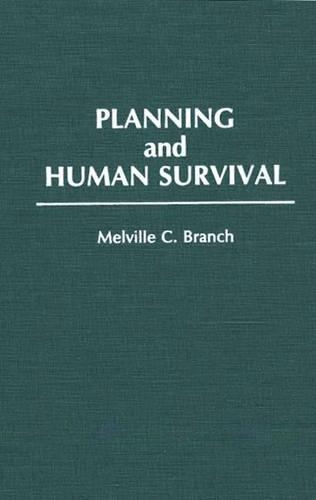
Planning and Human Survival
(Hardback)
Publishing Details
Planning and Human Survival
By (Author) Melville C. Branch
Bloomsbury Publishing PLC
Praeger Publishers Inc
16th June 1992
United States
Classifications
Tertiary Education
Non Fiction
Sociology and anthropology
303
Physical Properties
Hardback
192
Description
Continuing a life-long study, this latest work by Melville Branch describes planning as an essential element in all human activity, a principal determinant of the current condition as well as of the future of society and survival of the species. He explains planning as a primary force in the development, prospects, and continuation of human society; he also defines the crucial role of the mass media in the types and success of planning. In nontechnical language, Branch investigates the primary problems confronting human society. Individual characteristics and societal features that affect planning, the types and applications of planning, advanced planning education and knowledge, and the societal situation and planning. This book aims to treat planning from a broader, more fundamental mental perspective than other studies in the field: as a process inherent in human activities, critical to societal success and a distinct intellectual discipline and managerial method. It will primarily be of interest to planners in civil government, business, the military, but to others as well.
Reviews
This is the fourth book in Branch's series on defining the planning process, on examination of planning by various formal organizations, and on planning at the individual level. Branch (Univ. of Southern California) addresses the basic questions of whether humankind will apply the planning process to solve fundamental problems in a way to advance and favor survival as a species or continue on a path of increasing self-destruction. Some of the critical problems identified as needing immediate planning attention include nuclear war, crime, terrorism, addiction, poverty, hunger, housing deficiencies, educational deficiencies, public health, family structure, religion, and population growth. Branch argues that amelioration of these problems may be achieved with comprehensive planning from the individual to the national governmental level. However, a key element in the success or failure of these efforts will be the role of the mass media in the planning process. Television is described as particularly important and is predicted to become even more influential in the future. The book is thoughtfully written but is not a significant academic treatise. The style of writing is conversational. Selected bibliography, brief index. General; undergraduate.-Choice
"This is the fourth book in Branch's series on defining the planning process, on examination of planning by various formal organizations, and on planning at the individual level. Branch (Univ. of Southern California) addresses the basic questions of whether humankind will apply the planning process to solve fundamental problems in a way to advance and favor survival as a species or continue on a path of increasing self-destruction. Some of the critical problems identified as needing immediate planning attention include nuclear war, crime, terrorism, addiction, poverty, hunger, housing deficiencies, educational deficiencies, public health, family structure, religion, and population growth. Branch argues that amelioration of these problems may be achieved with comprehensive planning from the individual to the national governmental level. However, a key element in the success or failure of these efforts will be the role of the mass media in the planning process. Television is described as particularly important and is predicted to become even more influential in the future. The book is thoughtfully written but is not a significant academic treatise. The style of writing is conversational. Selected bibliography, brief index. General; undergraduate."-Choice
Author Bio
MELVILLE C. BRANCH is Distinguished Professor of Planning Emeritus in the School of Urban and Regional Planning at the University of Southern California, Los Angeles. His many books include Regional Planning: Introduction and Explanation (Praeger,1988), and Planning: Universal Process (Praeger, 1990).
